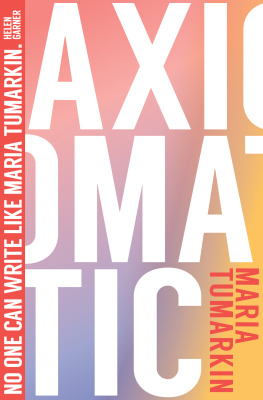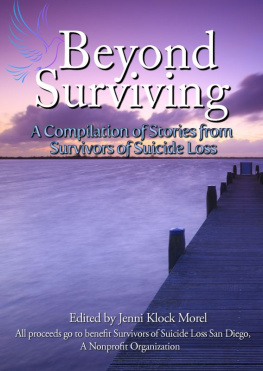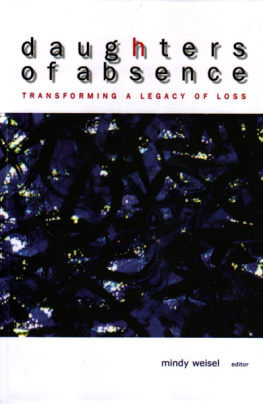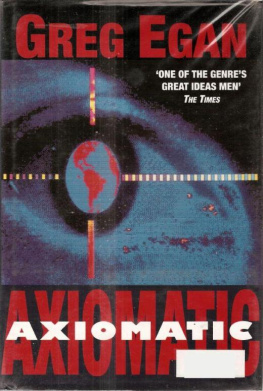
PRAISE FOR AXIOMATIC
An explosion of a book. Plumbing the depths of injustice, trauma, prison, and the flaw of good intentions, Maria Tumarkin is an important voice on American shores. Her eye is razor-sharp, her writing unsparing.
Mark Haber, Brazos Bookstore
A stunning exploration of the ways grief and trauma live on inside both our communities and ourselves. Axiomatic seeks to explore how poorly equipped our self-made structuresboth civic and emotionalare to deal with serious pain, and Tumarkin does so with a crystalline intelligence, submerging the reader into her own brightly lit consciousness.
Vanessa Martini, City Lights Books
As brilliant and idiosyncratic as writing gets. The topics Tumarkin addresses serve to ask a larger question: as we move through the world, how do we address the effect we have on one another? Axiomatic feels like the best conversation youve ever had with the smartest person youve ever met.
Thomas Flynn, Volumes Bookcafe
With penetrating sentences that feel as though theyve each been sharpened to an individual point, Tumarkin excavates the origins of trauma in all its unknowable vastness and unwavering turpitude.
Justin Walls, Powells Books
Tumarkins profiles of courage, justice, and history are bolstered by quotes and passages from writers as distinct as Raymond Carver, Wisawa Szymborska, and Julia Kristeva. With their help she finds the fittest words to explore her subjects and excavate memories, whole honeycombs of them.
John Francisconi, Bank Square Books
Axiomatic is a book I went into with high expectations that were absolutely met and surpassed on all levels.
Hans Weyandt, Milkweed Books
Does time really heal all wounds or only pass them on? In a series of case studies that shift the focus from the motives and humanity of the rescuer to those of the people needing help, Tumarkins passionate and compassionate study of trauma explores what humans do with their pain and dramatically shows that there is no one-size-fits-all answer.
Laurie Greer, Politics and Prose
A raw and honest look at trauma without any excuses or pleas for pity. Everyone should be required to read this book, if for no other reason than to better understand those around us.
Nick Buzanski, Book Culture
The hybrid piecesjournalistic, essayistic, and autobiographicalin Tumarkins Axiomatic feel daring, unsettling, revelatory. Her writingwith intense empathy, disciplined cultural history, and up-to-the-moment analysisbrings us all closer to truth.
Arlo Klahr, Skylight Books
Tumarkin shares with [Helen] Garner a gimlet eye for the flaws in official systems, along with a fascination for the narratives nested in everyday lives. Axiomatics symphonic structure, however, recalls Svetlana Alexievich, the Belarusian journalist and Nobel Laureate. She is another for whom reality attracts like a magnet, who has made a career out of appropriating and braiding voices and documents, seeing the world as a chorus and a collage. With this remarkable, wild, risk-laden book, Tumarkin has earned the right to be mentioned in the same breath as both of them.
The Saturday Paper
Axiomatic is a series of open-ended essays about different people, as well as Tumarkins own intense experiences of love and friendship. Consoling pieties do not interest her. There is no resolution, no comfort. It is a bleak view of the world, but for many people, including Tumarkins friend Vera, Thats how it goes. This happened. That happened. I am here. You are here. Lucky for us Tumarkin is here, too. Trying.
The Monthly
Again and again in Axiomatic, Tumarkin confronts the meagreness of the written word in the face of trauma as she muses on her inability to write the text she had intended. Yet again and again, she herself demonstrates what literary prose can do.
Sydney Morning Herald
AXIOMATIC
AXIOMATIC
Maria Tumarkin

Published by Transit Books
2301 Telegraph Avenue, Oakland, California 94612
www.transitbooks.org
Copyright Maria Tumarkin, 2018
First US edition published by Transit Books in 2019
Excerpt from The Year of Magical Thinking by Joan Didion. Reproduced with permission of Penguin Random House. Copyright 2006.
Excerpt from Celestial Harmonies by Peter Esterhazy, translated by Judith Szollosy. Reproduced with permission of HarperCollins Publishers. Copyright 2004.
Excerpt from Portnoys Complaint by Philip Roth. Reproduced with permission of Penguin Random House. Copyright 1969.
Excerpt from Sounds, Feelings, Thoughts: Seventy Poems by Wislawa Szymborska. Reproduced with permission of Princeton University Press via Copyright Clearance Center.
Excerpt from Elie Wiesel, The Art of Fiction No. 79 interview by John S. Friedman, originally published in The Paris Review ISSUE 91, SPRING 1984. Copyright 1984 by The Paris Review, used by permission of The Wylie Agency LLC.
LIBRARY OF CONGRESS CONTROL NUMBER: 2019942973
DESIGN & TYPESETTING
Justin Carder
DISTRIBUTED BY
Consortium Book Sales & Distribution
(800) 283-3572 | cbsd.com
Printed in the United States of America
9 8 7 6 5 4 3 2 1
All rights reserved. This book or any portion thereof may not be reproduced or used in any manner whatsoever without the express written permission of the publisher except for the use of brief quotations in a book review.
CONTENTS
Some names have been changed (Vandas clients in History repeats itself) or turned into initials (Time heals all wounds) or removed altogether (Those who forget the past are condemned to re). This was done for reasons of privacy and safety.
TIME HEALS ALL WOUNDS
FOR FIVE YEARS everything Frances wrote was about her sister. Once she had been good at deadpan humour. Whered that go, and the sarcasm? She was seventeen, Katie had been sixteen. Their mother used to deck them in matching clothes: denim dresses most often. People mistook them for twins.
In a Year 12 English assignment Frances wrote
when I walked into her room that morning I could sense something was terribly wrong. She was positioned awkwardly, defying gravity.
A year later at uni
kneeling forward on her knees, incredibly still. I thought she had fallen asleep, obliquely
Part way through an end-of-semester piece the following year
hair was falling over her face, shielding the truth. Her body was covered in prominent blue veins, gripping themselves over her youthful body.
After five years something shifted. Questionswhyd she call and ask me to wake her? why would she want me to find her? and the big one: did she mean it?were no longer at Francess throat. Frances could imagine them turning into statements.
SHE WANTED ME TO FIND HER
SHE MEANT IT
Five more years and Frances doesnt need to talk about it that much, maybe to some people, maybe once in a while. She knows what movies to avoid and with her sisters they dont need to go over it. Maybe her father was wanting some family talk when he said Cheers to Katie on the tenth anniversary and they all raised a glass? Its possible. Shell ask him.
I meet Frances as the shifting is beginning. Katies death doesnt sit anymore on her chest at all times, making her work for every breath, its knees pressed into her ribs. I was so lost when you met me, shell tell me later, so confused, and young, bound up all the way with her.
We meet and I ask Frances about casseroles. Everyone knows about casseroles. A person dies and peopleclose, dear people and virtual strangers, some signed up to a special rosterconverge on the dead persons house bearing casseroles. And the way the casseroles appear and just as suddenly disappear, weeks later, brings to mind, it is true, flocks of birds swooping down then taking off. Swish. For those weeks, sometimesthough not frequentlymonths, the family inside that house,
Next page










